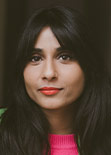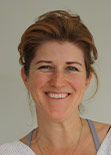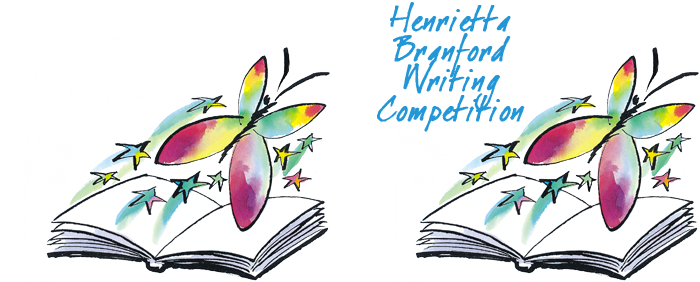Author: Christine Pillainayagam

The Branford Boase Award judges praise Ellie Pillai is Brown as humorous, authentic, with well-developed characters. Where did the idea for the book come from and what was your starting point?
The idea for the book came from some of my own experiences growing up as a second-generation immigrant in a majority white community. At the time, I’d been watching a lot of nostalgic 90s movies and realised how I’d grown up never seeing anyone like me as the heroine, or the main character in a love story. I was pining for nostalgia because the world was changing in a way that I felt uncomfortable with. Donald Trump had become president closing American borders to people from Muslim countries. My eldest son came home from school and told me that we wouldn’t be able to go to America anymore because we were Brown. He started asking questions about his race and identity – and in going to bookshops to try and find material to help me support the conversations I was having with him, I saw things hadn’t changed much in terms of representation. I didn’t see Black and Brown stories on the shelves – particularly ones that focused on joy. It made me want to sit down and write a story for me at 15. Something that would have made me feel seen and understood, that talked about what I was facing with humour and joy but didn’t shy away from some of the more challenging issues. I always say it’s a classic coming of age story with the added layer of colour; Ellie’s a British teenager growing up with all the classic teenage woes – but she’s also caught between two cultures, dealing with grief and a sense that she doesn’t really belong anywhere. It’s a love story that focuses on falling in love with yourself, and realising acceptance comes from within.
You include Ellie’s songs in the book. How does music affect your writing?
I knew straight away that Ellie was going to be a singer songwriter, and that she lived her life through songs. She’s fundamentally quite a fearful character, not one to rock the boat – but music is the one place she feels completely herself, completely unafraid. Her songs just grew from the page. I hadn’t intended to write them, but they were a bit unstoppable, they were part of what she wanted to say. I also made a playlist of what I thought she’d be listening to and had it on while I was writing. I’d like to think some of my prose is quite lyrical, and it’s probably because of that. I love the rhythm in words.
What did you enjoy most working with your editor Leah on the book?
Leah saw the joy in the book straight away, but she also saw places where I was holding back. It’s written in a way that makes it easy for younger teenagers to engage with, but it also deals with some big themes like race and identity, grief, sexual orientation, consent. I’d definitely downplayed certain parts to make them more palatable, and she challenged me not to do that. She gave me permission to really dig deep in those areas and not be afraid to make the reader think. I just always felt like she was on my side and wanted me to create a story was true to me.
Do you have a favourite scene in the book? Can you describe it for us?
My favourite scene in the book is the one where Ellie and her love interest are messaging songs back and forth. They both have these individual soundtracks going in their heads and when they share them with each other, it’s this really powerful personal moment of connection. I can’t think of anything more romantic than someone sending you a song that perfectly encapsulates how you’re feeling in that moment, as though they completely understand you and exactly what you need. In the background to all of this, is the fact that he’s comforting her on the anniversary of her brother’s death, and he’s also going out with her best friend; so it’s this kind of forbidden connection laced with historical trauma, something beautiful coming out of something painful.
What advice would you give to debut writers?
Write the story you want to read. Also, you’ll hear a lot of nos, but you only need one yes – so keep going.
Editor: Leah Thaxton

What was it about Christine’s writing that most excited you about her book?
When I first read Christine’s novel I pinched myself – it couldn’t possibly be a debut; or this thought-provoking and funny. Christine is the voice of a generation. As editor, my job is to ask questions that might help shape a book. My journey with Ellie Pillai is Brown has been an honour and a blast – because Christine is the real deal and so gorgeous with it too. She writes for readers who absurdly haven’t yet seen themselves in novels – what marks her out as exceptional is that she does so with such style, intelligence and charm, citing universal truths that have stayed with me and all who read her novels long after reading. She has the ability to nail character in a sentence, and to write dialogue that sings. I’m just so happy to have been along for the ride.
What were the main things you worked on with her as editor?
I’d love to blow my own trumpet, but Christine did not need much help with this novel.
But it was such an enriching editorial journey, partly because Christine is so talented it’s scary – but also because of the conversations we went on to have – we discussed how easy it is for well-intentioned people to assume that they know the whole story, especially when it comes to race. And about people jumping to conclusions before listening, assuming that what they’ve read is the same as someone’s lived experience. Ellie Pillai doesn’t just feel isolated and othered. She is isolated and othered. But that also does not wholly define her. It’s what she lives through some or all of the time, but she’s also living through all the other things that every other teenager experiences too. So she’s got much more on her plate than every other one of her peers in that school… I feel exhausted for her….
(We also talked about how much airtime we could give to all of Christine’s other characters – they all have a tale to tail and each one is fascinating, you could create a Netflix series out of this cast (will someone reading this please), so I had to ration her!
What do you think marks out the most successful YA writers?
Voice! Dialogue! YA readers are wrestling with big topics and having tough conversations. The world hasn’t gotten any easier. A writer that can touch on those themes in an engaging, honest and satisfying way is a rare thing. To do it with humour too is, for me, the holy grail.
What do you find most satisfying about being an editor?
I just love ‘shopping’ for the very, very best books, working to position them brilliantly and then the bit that makes me well up: reading those reader reviews that give you goosebumps and show you’re changing lives.
What advice would you give anyone wanting to write for young people?
Listen to them talk, listen to what they’re actually experiencing. And then see what that inspires. Don’t assume!
Ellie Pillai is Brown is published by Faber & Faber, 978-0571366910, £8.99 pbk.
Thank you to Christine Pillainayagam and to Leah Thaxton for answering our questions.



